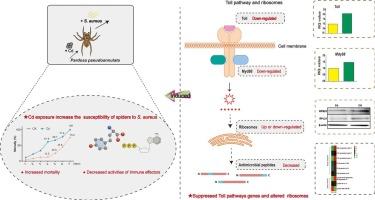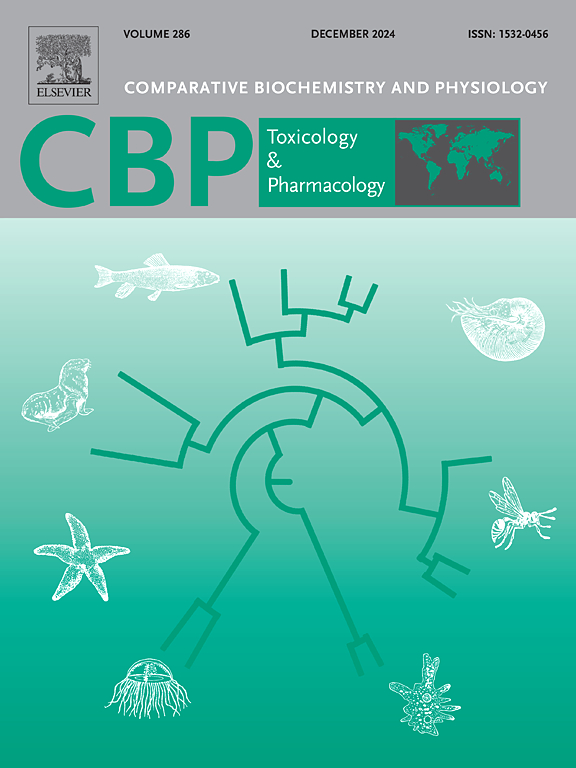镉暴露提高了假环狼蛛对病原菌的敏感性
IF 4.3
3区 环境科学与生态学
Q2 BIOCHEMISTRY & MOLECULAR BIOLOGY
Comparative Biochemistry and Physiology C-toxicology & Pharmacology
Pub Date : 2025-08-05
DOI:10.1016/j.cbpc.2025.110307
引用次数: 0
摘要
受镉等重金属污染的农田土壤在世界范围内普遍存在。镉污染可能会损害水稻节肢动物抵抗寄生虫和病原体感染的能力,从而对水稻节肢动物造成重大挑战。本研究探讨了Cd暴露对假环伞虫(Pardosa pseudoannulata)对病原菌金黄色葡萄球菌抗性的影响。生态毒理学试验表明,Cd暴露显著降低了蜘蛛对病原体的抵抗力,其证据是累积死亡率增加,关键免疫效应物活性或ATP水平受到抑制。抗菌肽如糖毒素和糖素的丰度也有所下降。多组学、RT-qPCR和western blot分析揭示了一系列在Cd负荷反应中起作用的基因,其中Toll通路和核糖体蛋白基因可能是免疫防御系统紊乱的潜在因素。这些发现扩大了重金属对水稻捕食者适合度参数的毒性机制研究。本文章由计算机程序翻译,如有差异,请以英文原文为准。

Cadmium exposure improved the susceptibility of wolf spider Pardosa pseudoannulata to pathogen
The farmland soil polluted by heavy metals like cadmium (Cd) was widespread around the world. Cd pollution may pose significant challenges to paddy arthropods by compromising their ability to resist infections from parasites and pathogens. This study investigated the impact of Cd exposure on the resistance of the Pardosa pseudoannulata against the pathogenic bacterium Staphylococcus aureus. Ecotoxicology assay suggested that Cd exposure significantly reduced the spider's pathogen resistance, as evidenced by increased cumulative mortality rates and suppressed activities of key immune effectors or ATP levels. The decreased abundance of antibacterial peptides such as lycotoxins and lycosins was also identified. Multi-omics, RT-qPCR, and western blot analyses revealed a set of genes that play roles in the Cd burden response, of which Toll pathway and ribosomal protein genes may be potential contributors to the disturbed immune defense system. These findings expanded the toxicity mechanistic investigation of heavy metals on the fitness parameters of paddy predators.
求助全文
通过发布文献求助,成功后即可免费获取论文全文。
去求助
来源期刊
CiteScore
7.50
自引率
5.10%
发文量
206
审稿时长
30 days
期刊介绍:
Part C: Toxicology and Pharmacology. This journal is concerned with chemical and drug action at different levels of organization, biotransformation of xenobiotics, mechanisms of toxicity, including reactive oxygen species and carcinogenesis, endocrine disruptors, natural products chemistry, and signal transduction with a molecular approach to these fields.

 求助内容:
求助内容: 应助结果提醒方式:
应助结果提醒方式:


